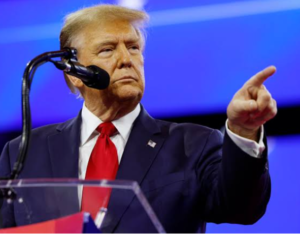Trump Administration Considers Expanding Travel Ban to Include Nigeria and 35 Other Countries
Trump Administration Considers Expanding Travel Ban to Include Nigeria and 35 Other Countries

Donald Trump
The Trump administration is reportedly considering a significant expansion of its travel restrictions, with a proposal that could add 36 more countries to the list of nations facing entry bans into the United States. This information comes from an internal State Department memo reviewed by The Washington Post.
Among those under consideration are 25 African nations—including U.S. allies like Egypt and Djibouti—as well as countries from the Caribbean, Central Asia, and the Pacific Islands. Nigeria, Africa’s most populous country, is also reportedly on the list.
According to the memo, foreign governments listed would have 60 days to meet newly established U.S. requirements. These include improving the reliability of identity documents, reducing incidents of visa overstays, and enhancing cooperation on deportation and security matters. An initial plan of action is expected from these governments by 8 a.m. on the set deadline.
The document, signed by Secretary of State Marco Rubio, outlines various concerns prompting the potential restrictions. These range from weak governance and civil documentation systems to alleged government corruption and poor cooperation with U.S. immigration enforcement. Additional issues cited include the sale of citizenship without residency requirements, and allegations of anti-American or antisemitic activities involving some nationals from the listed countries.
The State Department declined to comment on internal communications, while the White House has not publicly responded to inquiries about the proposed policy.
If enacted, the plan would mark a further intensification of the Trump administration’s approach to immigration and national security. It would also expand on a prior proclamation issued on June 4, which imposed full travel bans on countries such as Afghanistan, Myanmar, and Iran, and partial restrictions on others including Cuba, Togo, and Venezuela.
Critics have condemned the travel ban policy as discriminatory, arguing that it disproportionately targets African, Muslim-majority, and developing nations. Civil rights groups and Democratic lawmakers previously challenged similar restrictions, some of which were upheld by the U.S. Supreme Court in 2018.
Though the Biden administration reversed the ban during its tenure, Donald Trump has vowed to reinstate and expand the policy if re-elected. In fact, one of his first executive orders upon reentering office included a directive for U.S. agencies to identify countries that fail to meet American security and vetting standards, potentially paving the way for new or renewed travel restrictions.
As of now, it remains unclear when or if the proposed expansion will be formally implemented.
TRENDING SONGS
 RCCG PASTOR ANGRY OVER CALLING Him“MR” INSTEAD OF “DR,” DECLARES CURSE ONLINE
RCCG PASTOR ANGRY OVER CALLING Him“MR” INSTEAD OF “DR,” DECLARES CURSE ONLINE
 NPMA Appeals to Nigerian Government for Compensation After Lagos Market Fire
NPMA Appeals to Nigerian Government for Compensation After Lagos Market Fire
 Rest Every Four Hours, FRSC Issues Safety Guide for Fasting Motorists
Rest Every Four Hours, FRSC Issues Safety Guide for Fasting Motorists
 NNPC Boss Ojulari Bags UK Energy Institute Fellowship
NNPC Boss Ojulari Bags UK Energy Institute Fellowship
 Shock in Anambra: Bride Disappears Moments Before Wedding
Shock in Anambra: Bride Disappears Moments Before Wedding
 Nigerian Woman Returns ₦330 Million Accidentally Credited to Her Account
Nigerian Woman Returns ₦330 Million Accidentally Credited to Her Account
 APC Don Reach Morocco?’ VeryDarkMan Reacts to Seyi Tinubu Poster
APC Don Reach Morocco?’ VeryDarkMan Reacts to Seyi Tinubu Poster
 Bride Breaks Down in Tears as Wedding Meals Were Kept Secretly While Guests Go Home Hungry
Bride Breaks Down in Tears as Wedding Meals Were Kept Secretly While Guests Go Home Hungry
 Odogwu by Day, Robber by Night: How Marriage Joy Turned Into Tragedy
Odogwu by Day, Robber by Night: How Marriage Joy Turned Into Tragedy
 Nigerian Officials Allegedly Pocket N4–6B Weekly Through Smuggling Cartels at Seme–Badagry Border
Nigerian Officials Allegedly Pocket N4–6B Weekly Through Smuggling Cartels at Seme–Badagry Border
Share this post with your friends on ![]()













